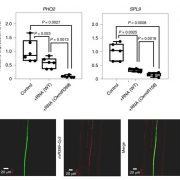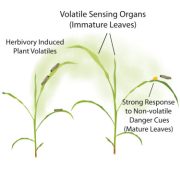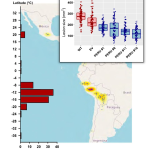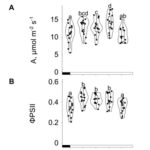Plant secondary metabolite-dependent plant-soil feedbacks can improve crop yield in the field
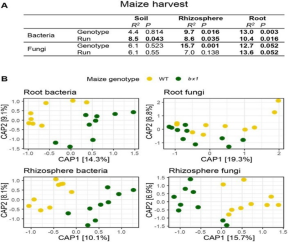 Plant secondary metabolites like benzoxazinoid can alter biotic and abiotic soil properties to shape plant performance through plant-soil feedback, but how this feedback affects agricultural productivity and food quality in the field context is unknown. Here, the authors used large-scale agricultural field experiments to assess the performance of winter wheat varieties growing in field plots whose soils had been conditioned by either wild-type or benzoxazinoid-deficient bx1 maize mutant plants. Results indicated that wheat yield was increased by over 4% without a reduction in grain quality in benzoxazinoid-conditioned soils. The higher plant biomass and kernel yield resulted from the increased subsequent wheat emergence, tillering, and plant performance in the field. The influence of the benzoxazinoid was also observed in the chemical and microbial fingerprints, although the former was more long-lived compared to the latter. This study provides evidence that soil conditioning by plant secondary metabolite-producing plants can increase crop yield via plant-soil feedback under agronomically realistic conditions. Future studies will be important to explore the generalizability and applicability of this concept. (Summary by Abdulmalik, Abdulkabir Omeiza @Omeiza_PlantDoc) eLIFE 10.7554/eLife.84988
Plant secondary metabolites like benzoxazinoid can alter biotic and abiotic soil properties to shape plant performance through plant-soil feedback, but how this feedback affects agricultural productivity and food quality in the field context is unknown. Here, the authors used large-scale agricultural field experiments to assess the performance of winter wheat varieties growing in field plots whose soils had been conditioned by either wild-type or benzoxazinoid-deficient bx1 maize mutant plants. Results indicated that wheat yield was increased by over 4% without a reduction in grain quality in benzoxazinoid-conditioned soils. The higher plant biomass and kernel yield resulted from the increased subsequent wheat emergence, tillering, and plant performance in the field. The influence of the benzoxazinoid was also observed in the chemical and microbial fingerprints, although the former was more long-lived compared to the latter. This study provides evidence that soil conditioning by plant secondary metabolite-producing plants can increase crop yield via plant-soil feedback under agronomically realistic conditions. Future studies will be important to explore the generalizability and applicability of this concept. (Summary by Abdulmalik, Abdulkabir Omeiza @Omeiza_PlantDoc) eLIFE 10.7554/eLife.84988



